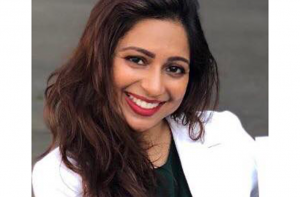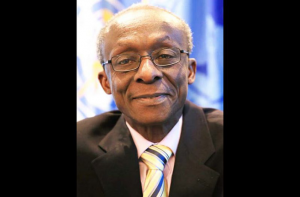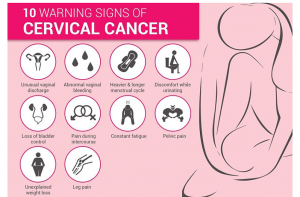— cervical cancer survivor says, doctors call for greater ‘buy-in’
SALLY PERSAUD, a 47-year-old market vendor, has been one of the numerous women diagnosed with cervical cancer locally, but, due to regular screening she was able to detect the cancer in its early stages and effectively cure it.
More than 15 years ago, in 2005, Sally’s 11-year-old daughter succumbed after she had been diagnosed with ovarian cancer. The loss of a child, more so a child that young, devastated Sally.
As the years went by, and the woman managed her grief, she became wary of her own health and opted to undergo regular screenings and checkups.

In 2015, Persaud decided to get a Visual Inspection of cervix with Acetic acid (VIA). This is a screening test that allows health professionals to determine whether a woman has cancerous cells in her cervix. Pre-cancer cells were found, but cryotherapy (a process involving freezing cells) was used to destroy those abnormal cells.
For a number of years, it seemed as though the medical crisis was averted. But then, in 2019, she noticed that she was experiencing heavy vaginal bleeding and as such, went for another checkup.
“I went to Dr Gobin, did a test and they took a biopsy and that was when they found I had early stage cancer,” Persaud told the Guyana Chronicle during an interview on Sunday.
She related that she was advised to undergo surgery and the mere thought of surgery, coupled with her diagnosis, brought back painful memories of her daughter. Though that terrified her, she underwent the hysterectomy.
For a few months after, she experienced minor pains but her family, especially her husband and two daughters, and friends were there to help nurse her back to full health. The surgery was a success and she became cancer free.

“I feel way better than before. I used to get sick steady and I used to get pain in my belly and back… since the surgery, it is not as painful as before,” Persaud related, reasoning, “Maybe if I didn’t go early, it would’ve been worse.”
PUBLIC HEALTH PROBLEM
Local gynecologist and oncologist, Dr Shivani Samlall, in a recent engagement with the Guyana Chronicle, highlighted that cervical cancer is a global public health problem but once detected early, it is curable.

In Guyana, according to Dr. Samlall, cervical cancer is the second leading cause of cancer incidents, with breast cancer being the most prevalent. In fact, according to recent statistics provided by her, 16.4 per cent of all cancer cases in Guyana are cervical cancer.
Meanwhile, in the global sphere, as of 2018, over 570,000 women have been diagnosed with cervical cancer. At that time, too, there were about 311,000 deaths. Dr Samlall lamented that this figure is expected to increase to 700,000 new cases by 2030.
What is important to note is that all of these deaths can be prevented if there is a regular screening regime in place that allows women to detect the cancer early and cure it.
But, Dr Samlall highlighted that it is not just about screening early. Emphasis, according to her, should be placed on treatment for women, too. This would include treatment of the pre-cancer lesions (the cryotherapy done by Persaud, for example), treatment of invasive cancer and also palliative care (providing patients with relief from their pain and other symptoms).
Many persons are often hesitant about cancer treatment because of the cost of undergoing treatment. Persaud, for example, underwent her hysterectomy at the Woodlands hospital, a private health facility.
“When you have persons who have to make a decision about whether they have to seek care about whether they will seek care for cancer or to feed themselves… they will of course feed themselves,” former Pan American Health Organization/ World Health Organisation (PAHO/WHO) Country Representative Dr William Adu-Krow lamented.
COLLECTIVE ROLE
Dr Adu Krow, a public health specialist, emphasised that governments, non-governmental organisations, faith-based groups and community members all have a role to play in reducing inequities in health services.
The month of January was designated as Cervical Awareness Month. Health Minister, Dr Frank Anthony highlighted that a comprehensive health plan is being crafted as part of the Health Ministry’s efforts to fight all forms of cancer. A specific emphasis, he told this newspaper, is being placed on cancers of the breast, cervix and prostate.
As part of this programme, the Health Minister also noted that there are plans afoot to increase the Human Papilloma Virus (HPV) vaccination rate.
HPV is the most common sexually transmitted infection (STI), the Center for Disease Control and Prevention (CDC) states, explaining that the virus has the potential to develop genital warts and cancer, in particular cervical cancer, among women. This HPV vaccine will help to immunise girls and prevent them from developing cervical cancer.
“In some countries, the HPV vaccine is also given to boys,” Dr Adu-Krow said too, but explained that when there are financial constraints, those vaccines are given to girls first. He, however, hoped that with Guyana’s new stream of revenues from the oil and gas industry, much more emphasis will be placed on widespread distribution of this vaccine.
While the wider efforts — geared at reducing the incidence of cervical cancer and treating more infected women — are engaged in, Persaud encouraged all women to get screened for cervical cancer.
“If I didn’t get tested early, I wouldn’t know anything and it would’ve gone way forward and maybe I wouldn’t have saved my life,” the market vendor said, adding that early detection, and a mountain of faith, helped to save her life.



.jpg)











